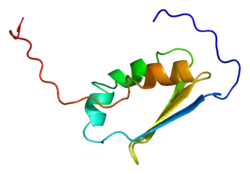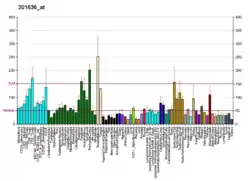FXR1
Fragile X mental retardation syndrome-related protein 1 is a protein that in humans is encoded by the FXR1 gene.[5][6][7]
The protein encoded by this gene is an RNA binding protein that interacts with the functionally similar proteins FMR1 and FXR2. These proteins shuttle between the nucleus and cytoplasm and associate with polyribosomes, predominantly with the 60S ribosomal subunit. Three transcript variants encoding different isoforms have been found for this gene.[7]
References
- GRCh38: Ensembl release 89: ENSG00000114416 - Ensembl, May 2017
- GRCm38: Ensembl release 89: ENSMUSG00000027680 - Ensembl, May 2017
- "Human PubMed Reference:". National Center for Biotechnology Information, U.S. National Library of Medicine.
- "Mouse PubMed Reference:". National Center for Biotechnology Information, U.S. National Library of Medicine.
- Siomi MC, Siomi H, Sauer WH, Srinivasan S, Nussbaum RL, Dreyfuss G (July 1995). "FXR1, an autosomal homolog of the fragile X mental retardation gene". EMBO J. 14 (11): 2401–8. doi:10.1002/j.1460-2075.1995.tb07237.x. PMC 398353. PMID 7781595.
- Bolivar J, Guelman S, Iglesias C, Ortiz M, Valdivia MM (August 1998). "The fragile-X-related gene FXR1 is a human autoantigen processed during apoptosis". J Biol Chem. 273 (27): 17122–7. doi:10.1074/jbc.273.27.17122. PMID 9642279.
- "Entrez Gene: FXR1 fragile X mental retardation, autosomal homolog 1".
- Siomi, M C; Zhang Y; Siomi H; Dreyfuss G (July 1996). "Specific sequences in the fragile X syndrome protein FMR1 and the FXR proteins mediate their binding to 60S ribosomal subunits and the interactions among them". Mol. Cell. Biol. 16 (7): 3825–32. doi:10.1128/mcb.16.7.3825. ISSN 0270-7306. PMC 231379. PMID 8668200.
- Zhang, Y; O'Connor J P; Siomi M C; Srinivasan S; Dutra A; Nussbaum R L; Dreyfuss G (November 1995). "The fragile X mental retardation syndrome protein interacts with novel homologs FXR1 and FXR2". EMBO J. 14 (21): 5358–66. doi:10.1002/j.1460-2075.1995.tb00220.x. ISSN 0261-4189. PMC 394645. PMID 7489725.
- Schenck A, Bardoni B, Moro A, Bagni C, Mandel JL (Jul 2001). "A highly conserved protein family interacting with the fragile X mental retardation protein (FMRP) and displaying selective interactions with FMRP-related proteins FXR1P and FXR2P". Proceedings of the National Academy of Sciences of the United States of America. 98 (15): 8844–9. Bibcode:2001PNAS...98.8844S. doi:10.1073/pnas.151231598. PMC 37523. PMID 11438699.
Further reading
- Zhang Y, O'Connor JP, Siomi MC, et al. (1996). "The fragile X mental retardation syndrome protein interacts with novel homologs FXR1 and FXR2". EMBO J. 14 (21): 5358–66. doi:10.1002/j.1460-2075.1995.tb00220.x. PMC 394645. PMID 7489725.
- Maruyama K, Sugano S (1994). "Oligo-capping: a simple method to replace the cap structure of eukaryotic mRNAs with oligoribonucleotides". Gene. 138 (1–2): 171–4. doi:10.1016/0378-1119(94)90802-8. PMID 8125298.
- Coy JF, Sedlacek Z, Bächner D, et al. (1996). "Highly conserved 3' UTR and expression pattern of FXR1 points to a divergent gene regulation of FXR1 and FMR1". Hum. Mol. Genet. 4 (12): 2209–18. doi:10.1093/hmg/4.12.2209. PMID 8634689.
- Siomi MC, Zhang Y, Siomi H, Dreyfuss G (1996). "Specific sequences in the fragile X syndrome protein FMR1 and the FXR proteins mediate their binding to 60S ribosomal subunits and the interactions among them". Mol. Cell. Biol. 16 (7): 3825–32. doi:10.1128/mcb.16.7.3825. PMC 231379. PMID 8668200.
- Tamanini F, Willemsen R, van Unen L, et al. (1997). "Differential expression of FMR1, FXR1 and FXR2 proteins in human brain and testis". Hum. Mol. Genet. 6 (8): 1315–22. doi:10.1093/hmg/6.8.1315. PMID 9259278.
- Suzuki Y, Yoshitomo-Nakagawa K, Maruyama K, et al. (1997). "Construction and characterization of a full length-enriched and a 5'-end-enriched cDNA library". Gene. 200 (1–2): 149–56. doi:10.1016/S0378-1119(97)00411-3. PMID 9373149.
- Khandjian EW, Bardoni B, Corbin F, et al. (1999). "Novel isoforms of the fragile X related protein FXR1P are expressed during myogenesis". Hum. Mol. Genet. 7 (13): 2121–8. doi:10.1093/hmg/7.13.2121. PMID 9817930.
- Tamanini F, Bontekoe C, Bakker CE, et al. (1999). "Different targets for the fragile X-related proteins revealed by their distinct nuclear localizations". Hum. Mol. Genet. 8 (5): 863–9. doi:10.1093/hmg/8.5.863. PMID 10196376.
- Tamanini F, Van Unen L, Bakker C, et al. (2000). "Oligomerization properties of fragile-X mental-retardation protein (FMRP) and the fragile-X-related proteins FXR1P and FXR2P". Biochem. J. 343 (3): 517–23. doi:10.1042/0264-6021:3430517. PMC 1220581. PMID 10527928.
- Bardoni B, Schenck A, Mandel JL (2000). "A novel RNA-binding nuclear protein that interacts with the fragile X mental retardation (FMR1) protein". Hum. Mol. Genet. 8 (13): 2557–66. doi:10.1093/hmg/8.13.2557. PMID 10556305.
- Ceman S, Brown V, Warren ST (2000). "Isolation of an FMRP-Associated Messenger Ribonucleoprotein Particle and Identification of Nucleolin and the Fragile X-Related Proteins as Components of the Complex". Mol. Cell. Biol. 19 (12): 7925–32. doi:10.1128/mcb.19.12.7925. PMC 84877. PMID 10567518.
- Tamanini F, Kirkpatrick LL, Schonkeren J, et al. (2000). "The fragile X-related proteins FXR1P and FXR2P contain a functional nucleolar-targeting signal equivalent to the HIV-1 regulatory proteins". Hum. Mol. Genet. 9 (10): 1487–93. doi:10.1093/hmg/9.10.1487. PMID 10888599.
- Hartley JL, Temple GF, Brasch MA (2001). "DNA Cloning Using In Vitro Site-Specific Recombination". Genome Res. 10 (11): 1788–95. doi:10.1101/gr.143000. PMC 310948. PMID 11076863.
- Schenck A, Bardoni B, Moro A, et al. (2001). "A highly conserved protein family interacting with the fragile X mental retardation protein (FMRP) and displaying selective interactions with FMRP-related proteins FXR1P and FXR2P". Proc. Natl. Acad. Sci. U.S.A. 98 (15): 8844–9. Bibcode:2001PNAS...98.8844S. doi:10.1073/pnas.151231598. PMC 37523. PMID 11438699.
- Kirkpatrick LL, McIlwain KA, Nelson DL (2002). "Comparative genomic sequence analysis of the FXR gene family: FMR1, FXR1, and FXR2". Genomics. 78 (3): 169–77. doi:10.1006/geno.2001.6667. PMID 11735223.
- Strausberg RL, Feingold EA, Grouse LH, et al. (2003). "Generation and initial analysis of more than 15,000 full-length human and mouse cDNA sequences". Proc. Natl. Acad. Sci. U.S.A. 99 (26): 16899–903. Bibcode:2002PNAS...9916899M. doi:10.1073/pnas.242603899. PMC 139241. PMID 12477932.
- Imabayashi H, Mori T, Gojo S, et al. (2003). "Redifferentiation of dedifferentiated chondrocytes and chondrogenesis of human bone marrow stromal cells via chondrosphere formation with expression profiling by large-scale cDNA analysis". Exp. Cell Res. 288 (1): 35–50. doi:10.1016/S0014-4827(03)00130-7. PMID 12878157.
- Gerhard DS, Wagner L, Feingold EA, et al. (2004). "The Status, Quality, and Expansion of the NIH Full-Length cDNA Project: The Mammalian Gene Collection (MGC)". Genome Res. 14 (10B): 2121–7. doi:10.1101/gr.2596504. PMC 528928. PMID 15489334.
This article is issued from Wikipedia. The text is licensed under Creative Commons - Attribution - Sharealike. Additional terms may apply for the media files.








